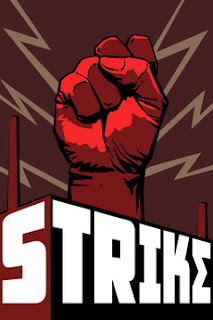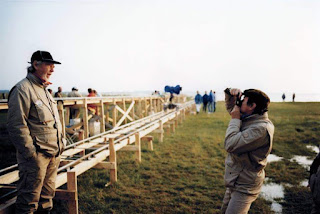Strike (1925), Sergei Eisenstein
Celebrating the Russian revolution, Eisenstein's communist propaganda necessitates the political encouragement to revolt against capitalist employers, using a working class Strike as a weapon to eradicate exploitation and seek justice for a fellow comrade, making up as the fundamental prospect of the ever influential work in the realm of cinema.
Eisenstein's directorial debut witnesses a grandeur of technical and storytelling magnitude, pertaining to a style of political efficacy by it's applied methods of connecting various montages, each carrying a fresh chapter, thereby ensuring extraordinarily fast progression which in turn grasps it's viewers' attentions to the peak.
The sovereign style of 'Strike' doesn't leave it's efforts short on aimed arthousery solely on a super taut and stylish narrative of rather grasping ease, but the dynamics of juxtaposing exquisite shots of somewhat avant-garde nature works as an absolute fine support with the usage of plain motifs and poetic complacency, eventually emphasizing the merits of it's expressionistic agenda to us.
'Battleship Potemkin' uses somewhat very similar political commentary on societal issues and class differences but 'Strike' outdoes it's enjoyable qualities with a simpler narrative and a much more interesting and socially relevant concept that the event breakage of the entirety into chapters does not play as a determinant factor on it's effectiveness.
The silent era of cinema has rarely witnessed, if at all, a great and stimulating exercise of visual symbolism of underlying contexts.
Eisenstein made 'Strike' stand out on this aspect by striking unrelenting and explicitly crude acts of sometimes coinciding the state of butchered pigs to the protestants by subtle implications and at other moments imposing factory machinery on laborers providing an open interpretation of the initiated motion entirely on it's viewers, that too not without obviousness, eventually creating a state of confusion and a peril of emotion.
As briefed earlier, Eisenstein portrayed the prowess and clarity of importance of communistic persuasions but until the final moments of the film, when Eisenstein himself reprimanded those notions he set formerly by gradually developing a futile revolution drenched in never ending chaos, the final effect of which was the impending manslaughter of the protestant's beliefs and tipping off the entire scale of operation against them.
However pessimistic it may sound, the relative realistic trait of the act cannot be overlooked and thus has been used as a strong message conveyor.
Much as a relevant artifact of historical value in the cinematic world, Eisenstein's 'Strike' is a strong revolutionary attempt on changing the ever existing oppression on inferior classes thereby highlighting the faults and glitches in systems and stays as reference to an exemplary work of technical brilliance.







Comments
Post a Comment